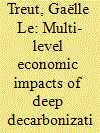| Srl | Item |
| 1 |
ID:
179727


|
|
|
|
|
| Summary/Abstract |
To cap global warming below 2◦C, countries are urged to upscale their climate commitments and develop national deep decarbonization (DD) strategies for the energy system. But, fast and deep transformations will have wide-ranging economic implications at the macroeconomic level, in energy industries, and also in other sectors. Such impacts need to be understood by policy-makers. This paper develops an original integrated approach based on loading consolidated energy pathways into a multi-sector economy-wide model to assess within a consistent framework the multi-level economic impacts of the DD strategies. The method is applied to Argentina and gives representative insights into the global challenge to move towards a low-carbon economy. Our results show key multi-level impacts of shifting from a ‘reference’ to a DD pathway by 2050. In energy industries, value-added and employment shift from fossil fuel to low-carbon power industries. Aggregated GDP and welfare impacts are limited but incremental investments are significant at the macroeconomic level, with indirect and induced impacts across the economy. It includes net job creations in upstream industries that supply low-carbon infrastructures, but also risks of job losses in exposed sectors. Eventually, our approach highlights enabling conditions and possible block points to lift to trigger the transition.
|
|
|
|
|
|
|
|
|
|
|
|
|
|
|
|
| 2 |
ID:
187592


|
|
|
|
|
| Summary/Abstract |
Deep decarbonization of energy systems poses considerable challenges to electricity markets and there is a growing consensus that an energy-only design based on short-term marginal cost pricing cannot deliver adequate levels of investment and long-term coordination across actors and sectors. Based on the instructive example of the evolution of European electricity market designs, we discuss several shortcomings of energy-only markets and illustrate how ad-hoc policies that intend to address them have limitations of their own, notably a lack of systemwide coordination. Second, we describe how the sheer scale and nature of deep decarbonization targets requiring massive investment in capital-intensive low-carbon technologies exacerbate these issues. Ambitious emission reduction targets thus require an evolution of market design towards hybrid regimes. Hybrid markets separate long-term investment decisions from short-term operations through a balanced and differentiated use of competitive and regulatory design elements to coordinate and de-risk investment. Finally, a historical analysis of the evolution of different electricity market designs shows how hybrid markets constitute contemporary forms of long-run marginal cost pricing that are appropriate for meeting deep decarbonization targets with reduced uncertainty and hence lower private and social costs.
|
|
|
|
|
|
|
|
|
|
|
|
|
|
|
|